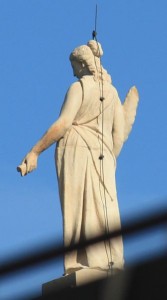Benjamin Franklin the Enlightened Scientist
 This week, for one of my Mass Communication courses at LSU, I have become familiar with one of my favorite scientists and journalists, Benjamin Franklin.
This week, for one of my Mass Communication courses at LSU, I have become familiar with one of my favorite scientists and journalists, Benjamin Franklin.
Benjamin Franklin, as he described himself in his autobiography, impressed me with his apt for reading and writing and his overall scientific curiosity. Not to mention his intellectually satirical way of writing that had me smiling as I read his recollections of his youth. With only a modest formal education, Franklin was famous and even revered in his own day for his accomplishments as a printer, author, politician, inventor, scientist, civic activist and diplomat, among the many other roles he fulfilled during his life.
Franklin was born in January 1706, in Boston, Massachusetts, of the American colonies. A thing to note about Franklin’s life was that he lived “wholly within the eighteenth-century Enlightenment”. Franklin had a family history of defending the middle class against wealthy landowners, with family coming to the colonies for their religious freedom (Autobiography). Franklin was also a true man of the Enlightenment, embracing science, reason, natural human rights, free thinking and morality. He personally did not agree with many of the rules and doctrines of religion as taught in church, favoring basic moral virtues that served “practical” purposes in the lives of men. He was tolerant of different churches.
With partners William Goddard and Joseph Galloway, Franklin published the Pennsylvania Chronicle, a newspaper known for its revolutionary sentiments and criticisms of the British monarchy in the American colonies (Autobiography). The writings of Benjamin Franklin, including his contributions to the United States Constitution, reflected Enlightenment principles.
As a boy, Franklin grew up in Boston before making his way to Philadelphia to work as a printer. He eventually started his own printing business in Philadelphia. He also worked in a famous printing house in London for a time. Having grown up and worked in the cities of the American Colonies and England, he had an appreciation for civil society and city affairs that other of America’s Founding Fathers did not. He was active in civil affairs all his life.
Franklin was also a scientist who was intrigued by the basic operations of nature, not just a tinkerer-inventor. He both carried out experiments on electricity and constructed the devices required to do so. As an indication of his self-taught scientific education, he often cited the work of famous scientists in the pamphlets about his inventions, and he was well acquainted with Isaac Newton’s writings. Preliminary experiments in which he observed that a pointed conductor could draw changes from a greater distance that a blunt conductor led to Franklin’s invention of the lightning rod. He also discovered the basic principle of conservation of electric change, an important principle in physics. Robert Millikan (who won the Nobel Prize in Physics for his work with electrons and for verification of Einstein's "photoelectric effect.") even declared Franklin to be the electron's “true discoverer.” Franklin garnered an international reputation for his experiments in science.
I think Franklin’s studies of philosophy, morality, natural science, matters of health, civil affairs and politics demonstrates the versatility of his skills and the vast nature of his curiosity. He had a mind for many different subjects, and in all his endeavors sought skill, discipline and responsibility to his fellow men. In service of public education, he founded a reading and writing club called the Junto and the American Philosophical Society. He also founded the University of Pennsylvania.
By the time Franklin died in April 1790, in Philadelphia, he was famous nearly worldwide as a journalist, inventor, businessman, statesman, military figure, diplomat, civic leader, musician, scientist, and even something of a humorist and traveler (PBS). Just to name a few.
